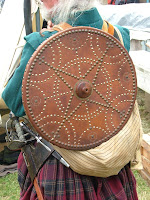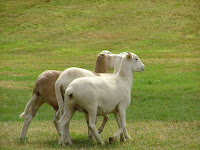I set out to write a story involving the Picts of ancient Scotland and I ended up writing a trilogy that revolved around an Irish clan and a vengeful goddess. After discovering Aedan mac Gabrain, it was hard to resist basing my hero on him.
After coming under pressure from the powerful Ui Neill clan in Ireland, the clan Gabrain came to Scotland (known then as Alba) in about 500 AD to form the kingdom of Dal Riata in what is now Argyle. There were two other clans, but the kings from clan Gabrain served as the high kings of Dal Riata. The Dal Riata clans had embraced Christianity while most of Alba had not.
Aedan mac Gabrain became king of Dal Riata in about 574, picked to be king by the famous St. Columba. This Irish king was known as the most feared warlord of his time by his contemporaries—the British King Riderch, King Urien of Rheged and King Morcant of Gododdin. They formed the Northern Alliance to battle the Picts and Angles. Aedan grew up around the River Forth, his younger years shrouded in mystery. What fascinated me most about Aedan mac Gabrain was that he supposedly fathered a king of the Picts, yet there are recorded battles between him and the Picts. Did he fight against his own son or did he help his son? Also, in the Welsh poems he is called ‘Aedan the Treacherous’ for invading King Riderch’s stronghold, but it doesn’t explain what led to this behavior.
Another thing that fascinated me about Aedan was that in a time when people died young, he lived to be at least 74. And he was present on the battlefield at 70. There is no record of his death, only that after his final battle and defeat at Degsastan, he was no longer king. The clan Gabrain has another notable legacy—Kenneth MacAlpin, the first recorded king of Scotland, is believed to be descended from this clan.
How could I resist such a fascinating historical figure?
For my hero, I saw Aedan as a shrewd, formidable man, two important requirements for a successful king in a time of shifting alliances, betrayal and determined enemies. In my mind, his mate would have to be strong-minded to match his wit and strength. I decided to make her a pagan, which would be the cause of much conflict between them.
And much to my delight I was still able to write a story with the Picts since Aedan had a connection to them.
Excerpt from Beltaine’s Song, Book 2, Dark Goddess Trilogy:
He let go of Galan and turned to Domelch, pressing his mouth close to her ear, his voice harsh with anger. “If ye want anything to do with the likes of him, then so be it, but I will not put up with his insolence any longer.”
Galan swayed on his feet, looking taken aback by Aedan's sudden attack.
“Mordag, see to it that my brother gets to his bed safely,” Domelch ordered, hurrying to catch up to Aedan.
“We need to discuss this.”
“Not now. I am tired.” Aedan kept walking at a fast pace up the path to their dun. The lamps lining the path flickered erratically as he passed them.
“Even if he remembers who I was before, that means nothing. I love you.” She panted, trying to keep up with his quick stride.
“I saw him touch ye under the table, and ye did not stop him.”
“I—I was shocked by his behavior and slow to react, that's all.”
“It is obvious that he is still obsessed with ye.” He quickened his pace.
“Aedan, please stop,” she said, struggling to keep up with his quick stride. “He was obsessed with Cardea. She no longer exists.”
He turned to look at her. “I am not so certain about that. Of late I see flickers of her inside of ye. I saw her cold ruthlessness during Comran’s interrogation and in our bedchamber…”
She turned her head away from the flickering light, hoping the night would shield her eyes so she wouldn't reveal her struggle against her dark past. “You seem to have no objections in our bedchamber.”
He stopped. His hot breath warmed her cheek. “Tell me that ye feel nothing for him and I will let it go.”
“I—I feel only brotherly love for him.”
“He is not yer brother. Tell me ye feel nothing for him, for the man who kidnapped ye and...and forced himself on ye.”
She could not. She knew that she should hate Galan for he did all those terrible things to her, but…that part of her that she thought lost had enjoyed it. She didn't love him. She never did, but she did care for him for he had shown her kindness later when she needed help, when she had no one else to turn to.
“I thought as much.” His face looked frightening in the flickering light, his jaw set in anger.
“A part of me cares for him, but I have given up everything for you. I renounced my Goddess, betrayed Cailleach and accepted your Christian ways.”
“Ye were nothing but a demon. If anything, I saved ye.”
His arrogant tone enraged her. “You saved me? Ha. You were the one cursed living like a miserable hermit in the forest.”
“We were both cursed if I remember it correctly.”
“I was perfectly happy as I was.”
“I think not. Ye were a wretched soul until I came along.”
Anger rose inside of her, anger only Aedan could raise. The blood rushed to her face, ringing in her ears. “If you want me to hate you, then you have succeeded.” She turned to flee from him.
He grabbed her arm, pulling her back into his body. “Hate me, do ye?”
Her pulse raced and her body flushed from anger. “Yes.” She struggled against him, but the hardness of his male body aroused her and she felt his erection pressing against her. She wanted to feel nothing for him, her anger making her stubborn, but her body betrayed her, tingling in places she had no control over. She stopped struggling and submitted to his touch, falling limp in his arms.
“Yer body does not hate me,” he whispered, crushing his lips to her mouth, kissing her roughly.
Anger turned into passion. Her body burned with desire underneath his touch.
Kelley Heckart, Historical fantasy romance author
Captivating...Sensual...Otherworldly
http://www.kelleyheckart.com
http://kelleysrealm.blogspot.com/
http://twitter.com/CelticChick
http://www.facebook.com/pages/Kelley-Heckart/111838455604
A Greek vampire, Celtic kings, vengeful goddesses, an ancient faery curse…
All three books of my Dark Goddess trilogy are available in Print and Ebook. Set in Dark Age Scotland, I mixed history with a Samhain/Beltaine myth that revolves around an Irish clan and the goddesses Brigit and Cailleach.











